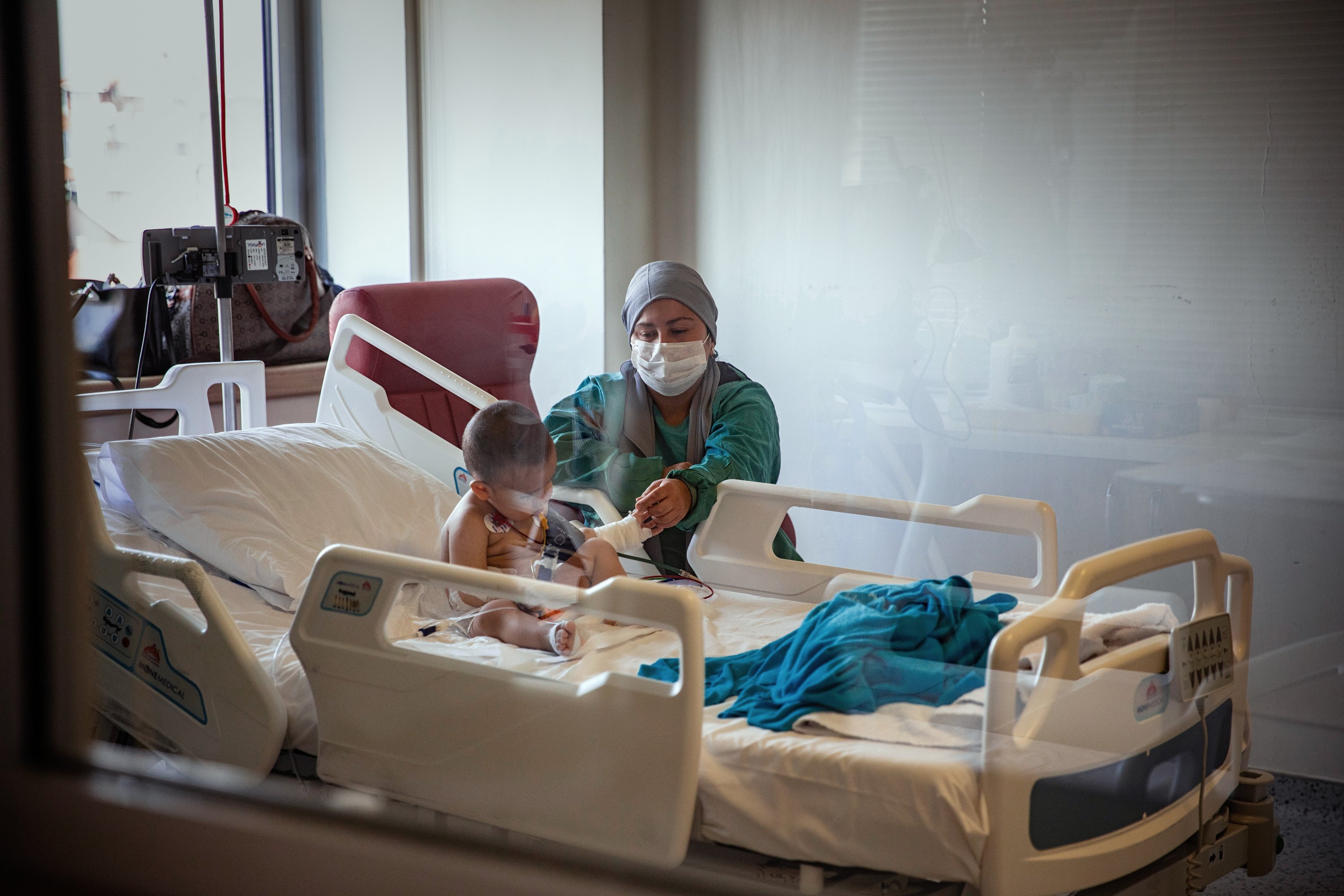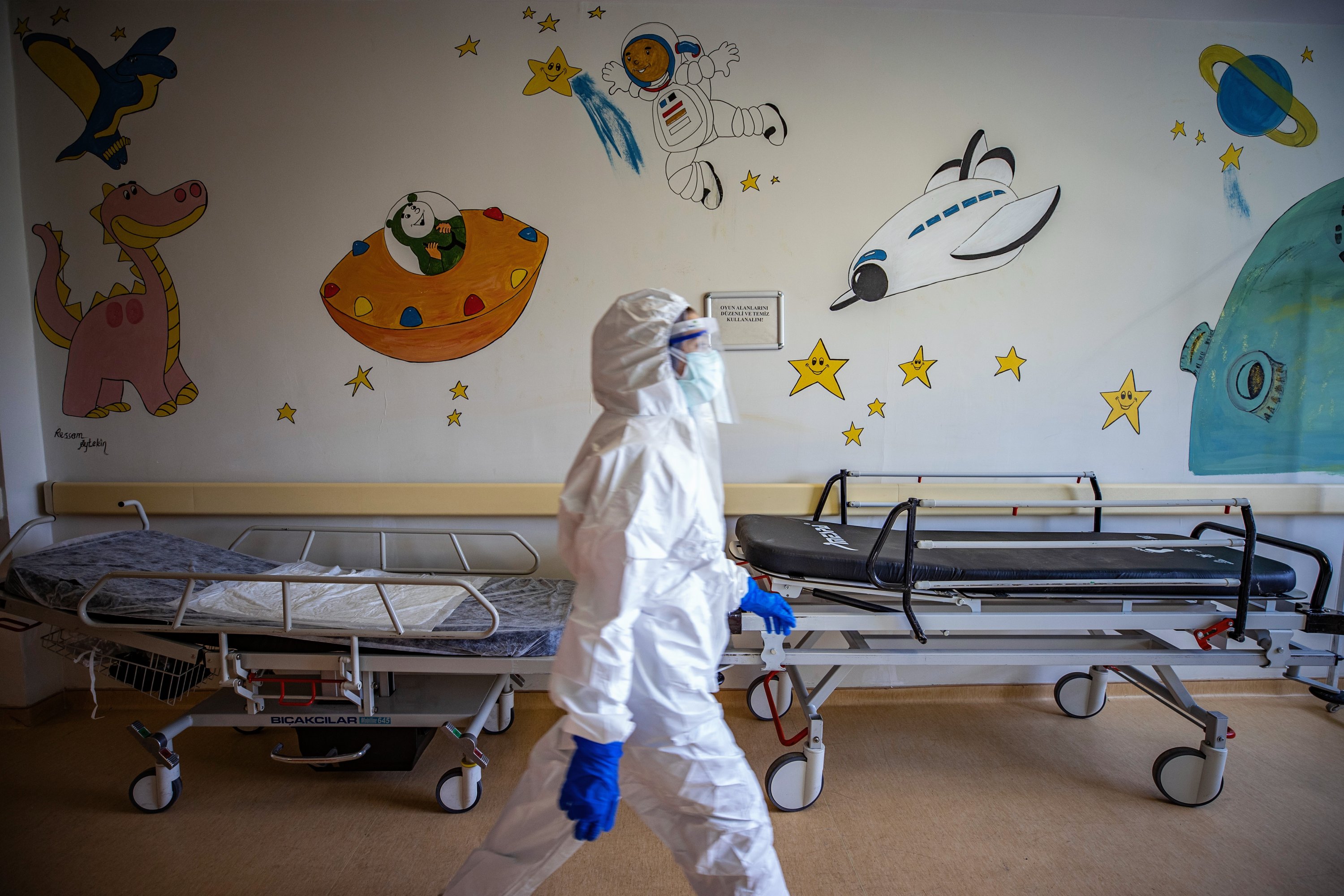© Turkuvaz Haberleşme ve Yayıncılık 2024
The fight against the coronavirus pandemic is focused on high-risk groups like the elderly first. Children were, for a time, considered to be just “spreaders” of the virus. But the pandemic also hits them hard when it does. At Ümraniye Training and Research Hospital in Istanbul, for young COVID-19 patients and those suffering from other diseases and separated from their infected parents, nurses and doctors replace the mothers and fathers, who have to stay away.
Health care workers have been at the forefront of the fight against the virus since March 2020, in a constant state of distress and uncertainty. Their devotion made it into the annals of Turkish medical history and they win even more hearts for their dedicated care of children. The hospital, on Istanbul’s Asian side, is one of the few in the city with a ward dedicated to children who either have the virus or other diseases that force them to be separated from their parents.
From attendants to doctors and nurses, everyone is mobilized at the ward in an attempt to stop the children, some as young as a few months old, from feeling lonely. Theirs is a difficult task as there is little to distract the children, as playgrounds and most of the toys at the children’s diseases ward were removed over pandemic concerns. Thus, most of them, particularly those confined to their beds, have to spend their days watching TV, reading books, or playing with the few toys they were able to bring with them.

Necdet Sağlam, the chief physician at the hospital, said they had to redesign the hospital to separate COVID-19 patients from others and the same applied to the children’s ward.
“This new era actually gave us a further emotional bond with patients. Our staff became closer to children and the mothers of newborns. Occasionally, children have to be isolated and they have no one other than our staff to care for their personal needs. Nurses and doctors feed them when they need or keep them company to (stave off the boredom of solitude),” he told Anadolu Agency (AA) Friday.
Sağlam says there has been a significant rise in children infected with COVID-19, though it ran parallel with the overall rise in the number of cases. “Children usually suffer from a secondary infection or multisystem inflammatory syndrome (MIS-C) but they are successfully treated here,” he says. Sağlam says children were more mobile and thus, more susceptible to the infection and they noticed that several infections among their patients stemmed from schools.
Sağlam added that all their staff sacrificed the time that ought to be spent with their families to work long shifts and occasionally succumbed to infection themselves. “It is their right to expect from the public to be at least careful about rules and not to spread infection,” he said.
Professor Betül Sözeri, who runs the children’s clinic at the hospital, said child patients did not experience heightened symptoms but they were concerned about the rise of the number of children who were infected by others, rather than being the host. “We have more frequently here now. More children are ending up in the emergency room with a cough, sore throat and nasal congestion. Here alone, the rate of positive patients after tests on every such patient is around 60-70%,” she says.
Children are only hospitalized if they suffer serious lung problems stemming from COVID-19 or are too young and have additional symptoms. Those with MIS-C are treated in a separate clinic. Sözeri says a minority among the MIS-C patients need intensive care but most patients are being discharged within 10 days, after their recovery.

Child patients are luckier than grownups as their symptoms are less severe but those with a chronic illness, like lung diseases, and those with cerebral palsy occasionally end up in intensive care.
According to the law, all children are required to stay at the hospital with a chaperone, usually a family member, but those companions are often infected with COVID-19 themselves. “We try to keep infants with their mothers but the infection forces us to separate them. This has been an emotional period for us as we have to care for children who are either infected with COVID-19 or have both their parents infected and with no one to care for them. Our nurses in particular have new tasks, from bathing to helping them to put on clothes and feeding them. It is a work from the heart. Everyone is acting like they are sister, brother, father, or mother to those young patients,” she said.
Miraç Koç, an intensive care nurse, says they feel “better” when the children smiled, had fun and when they called for a nurse. “You feel happy when you notice you are trusted, needed. Infants, in particular, do not accept food from someone else. When they accept us to feed them, it is a sign of trust for us. Unlike grownups, children have a more natural reaction to your actions,” she said.

Kübra Öz works as a nurse at a children’s infectious diseases clinic where children, from newborns to those aged 18, are being treated. “Children are either left alone or have other relatives than parents when their parents are infected. They view us as an older sister and we try to act like one. We are always with them and know what they are going through,” she says. Öz recalls an emotional moment when she and others had to hide the death of a mother from her child who was a COVID-19 patient in their ward.
Leyla Yüksel works as a midwife at a newborn clinic at the hospital and is tasked with the care and treatment of children of COVID-19 patients. “Mothers are in intensive care and we have to approach their children like they are infected as well. Here, now I'm caring for a 33-week-old baby whose mother tested positive for the coronavirus before the birth. She had to deliver earlier than the scheduled date as her condition was severe. We are both helping her to do exercise so she will be able to breastfeed once she recovers and can care for her baby,” she says. Mothers are occasionally allowed to breastfeed their newborn, but only after wearing head-to-toe personal protective equipment (PPE).
